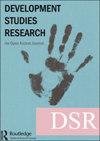卫生支出对环境质量的影响——以金砖国家为例
Q2 Social Sciences
引用次数: 20
摘要
摘要空气传播的流行病(例如新冠肺炎)与空气污染之间存在着重要而致命的联系,因为空气中的颗粒物会加剧此类疾病的传播。此外,经济弱势群体更容易受到影响。本文分析了2000-2007年金砖国家(即巴西、俄罗斯、印度、中国和南非)卫生支出对碳排放的影响。采用完全修正的常最小二乘(FM-OLS)、向量误差校正模型(VECM)Granger因果关系和Dumitrescu–Hurlin因果关系检验。就卫生支出总额而言,当前卫生支出水平与碳排放量呈显著负相关。关于分类变量,私人卫生支出也与排放量有着显著的负相关。然而,国内一般政府卫生支出和外部卫生支出与碳排放呈正相关。还提供了具体国家的结果。因果关系检验证实了当前卫生支出、私人卫生支出和国内一般政府卫生支出水平与碳排放之间的双向因果关系。金砖国家的外部卫生支出不会导致排放,反之亦然。还讨论了VECM的因果关系。研究结果表明,有必要审查卫生支出子政策项目,以实现零碳目标。本文章由计算机程序翻译,如有差异,请以英文原文为准。
The impact of health expenditure on environmental quality: the case of BRICS
ABSTRACT There is a significant and deadly link between air-borne pandemics (for example, COVID-19) and air pollution, as airborne particulate matter enhances the spread of such diseases. Moreover, economically disadvantaged groups are more susceptible. This paper analyses the effects of health expenditure on carbon emissions in BRICS (that is, Brazil, Russia, India, China and South Africa) countries from 2000 to 2017. The Fully Modified Ordinary Least Square (FM-OLS), the Vector Error Correction Model (VECM) Granger causality and the Dumitrescu–Hurlin causality tests are employed. In terms of aggregate health expenditure, the level of current health expenditure is significantly and negatively connected with carbon emissions. With regard to disaggregated variables, private health expenditure is also negatively and significantly linked to emissions. However, domestic general government health expenditure and external health expenditure are positively and significantly associated with carbon emissions. Country-specific results are also provided. The causality tests confirm bi-directional causality between the level of current health expenditure, private health expenditure, and domestic general government health expenditure, and carbon emissions. External health expenditure in BRICS does not cause emissions, and vice-versa. VECM causal links are also discussed. The results point to the need to review health expenditure sub-policy programs to achieve zero-carbon targets.
求助全文
通过发布文献求助,成功后即可免费获取论文全文。
去求助
来源期刊

Development Studies Research
Social Sciences-Development
CiteScore
3.20
自引率
0.00%
发文量
20
审稿时长
12 weeks
期刊介绍:
Development Studies Research ( DSR) is a Routledge journal dedicated to furthering debates in development studies. The journal provides a valuable platform for academics and practitioners to present their research on development issues to as broad an audience as possible. All DSR papers are published Open Access. This ensures that anyone, anywhere can engage with the valuable work being carried out by the myriad of academics and practitioners engaged in development research. The readership of DSR demonstrates that our goal of reaching as broad an audience as possible is being achieved. Papers are accessed by over 140 countries, some reaching over 9,000 downloads. The importance of the journal to impact is thus critical and the significance of OA to development researchers, exponential. Since its 2014 launch, the journal has examined numerous development issues from across the globe, including indigenous struggles, aid effectiveness, small-scale farming for poverty reduction, sustainable entrepreneurship, agricultural development, climate risk and the ‘resource curse’. Every paper published in DSR is an emblem of scientific rigour, having been reviewed first by members of an esteemed Editorial Board, and then by expert academics in a rigorous review process. Every paper, from the one examining a post-Millennium Development Goals environment by one of its architects (see Vandermortele 2014), to ones using established academic theory to understand development-imposed change (see Heeks and Stanforth 2015), and the more policy-oriented papers that contribute valuable recommendations to policy-makers and practitioners (see DSR Editor’s Choice: Policy), reaches a multidisciplinary audience.
 求助内容:
求助内容: 应助结果提醒方式:
应助结果提醒方式:


